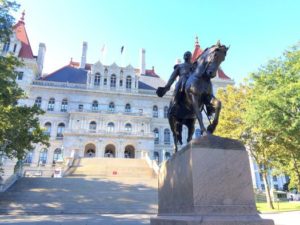February 6, 1945. In an interesting coincidence, both Isabell Pawluc and Stanislaus Kosinski, two friends from Albany who are associated with the St Cecilia’s choir, write letters to Dad on the same day. The letters are interesting in that the same themes that were covered in Anna’s letter of February 3 are covered regarding the recent winter weather and the resulting coal shortage in the city.
Isabelle starts her letter with a poem of her own:
“Yes, Gen. Sheridan still mounts his mare,
Overlooking our city of beauty so rare.
The snow is all drifted, and the weather is fair,
‘Tis the end of my verse and don’t cha wish you were there.”

Statue of Gen. Sheridan in front of the NY Statehouse in Albany. Photo credit www.allaboutalbany.com
She then gets right to the news about “enough snow and sub-zero weather…to warrant mild winters for ten years to come. Perhaps you’ve already heard of the coal shortage in N.Y which has affected me in several different ways. Since all the schools are closed including St. Casmir’s, the choir had to rehearse at my home.”
She details other effects of the coal shortage, some of which were detailed in Anna’s letter. “The department stores and all entertainment places have been closed over a week during the emergency and there is positively nothing to do. I’m going to the movies at least three times next week to make up for lost time. Managed to get in plenty of reading during recent dull evenings…”
Isabelle also relays news about other choir members. Most notably “…the professor [Kosinski] suffered a heart attack around New Year’s Day and hasn’t been himself since. He cancelled all his appointments for several weeks and is doing as little as possible now. We rehearse only once a week now. With a little rest he is showing some improvement. You can imagine what an empty feeling I had when I saw the organ bench empty at New Year’s Mass.”
She also writes, “Alex [Kosinski] appeared in church Sunday in a Captain’s uniform, since he is a commissioned officer in the State guard. The governor mobilized the guard to help clear the freight that was tied up and Alex served in his capacities as a physician. That fellow certainly does get around having a practice of his own, plus teaching at the Medical College, plus directing the Blood Bank plus being assistant to Dr. Wright, plus singing bass in our choir. Wonder what he does in his spare time?”
As far as what Professor Stanislaus Kosinski has to say, he makes no mention of his heart attack or the time that he had to take off as a result. He does write, “I hope this letter will find you in good health. I am very glad that you are still in this country. The war news seems very good. In Germany the end fighting is not very far off and out in the Pacific things are very encouraging.”
He gets to the weather describing the “severe winter” as “something on the Russian style, with plenty of cold weather and snow which tied up transportation badly.” He also writes about the coal shortage and that “all schools were closed for a week and the stores and theaters for several days.” He mentions the impact on the choir in that “last week we held our rehearsal at Isabelle’s house as the school was …without heat.”
In other news about the choir they have attended several performances, including Verdi’s Aida, Carmen and La Traviata. Kosinski also writes that the choir performed “a few carols for the Intercultural Group at the Joseph Henry Memorial and on Dec. 28 over the station WABY.”

